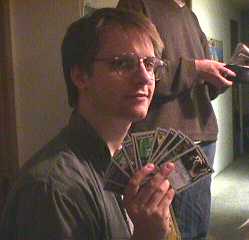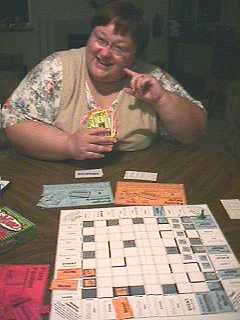
Seattle Cosmic's Desert Island Games
You're about to embark on a brief ocean voyage from Three Hour
Tours, Inc. Observing the patently incompetent skipper swatting the
"first mate" with his captain's hat and calling him his "little buddy"
(IF you know what I mean), you are not inspired with confidence that
you will ever return.
Should you happen to be shipwrecked on a desert island, what five
games would you take? According to Peter Sarrett of The Game Report, "On
the desert island to which I'm destined, I'm guaranteed copies of go,
chess, checkers, and backgammon, as well as decks of playing cards,
pencils and paper, and a supply of like-minded castaway
opponents. This allows me to ignore the classics and cut to the
meatier decisions..." Those are the rules we'll use too. And don't be
afraid to bring some of the same games -- after all, we all might end
up on different islands. Then we can use our separate boards to play
by email, using the inter-island coconut telegraph set up by this
professor guy who's coming along...
Here are the games chosen by Seattle Cosmic members, in
the order the messages appeared on the SC mailing list.
Ron Hale-Evans

It's hard to pick! Here are my five:
- COSMIC ENCOUNTER.
How did you guess? I'd want to bring my imaginary super-multi-edition
fully-expanded set, with components from Eon Basic + Expansions 1-9,
Mayfair CE/More CE and Simply Cosmic, Hasbro/AH, and all the Internet
expansions I could print. Plus plenty of crayons and coloured pencils
to draw the aliens on the blank power cards. I would have to bring
plenty of my patented deck protectors so I could mix and match
components from all sets, including the colourful Hasbro/AH Attack
cards with the wiseass sayings on them -- something I plan to do
eventually with my "real" set. (Incidentally, Cosmic also made Peter
Sarrett's two lists, as well as that of Richard Garfield, creator of
MAGIC: THE GATHERING, who wrote, "Cosmic Encounter really
defies any easy classification. Cosmic Encounter I dearly love, as it
taught me what it truly meant to have variety in play.")
- NOMIC.
Invent your own game! The best self-modifying game. Talk about
endless variety in play! I played a single game of Nomic in college that
lasted two and a half years. Whenever we got bored of straight Nomic, we'd
vote in a subgame of Cosmic Encounter, Illuminati, Black Spy, or Nuclear
War.
- GURPS.
I'd have to bring along some kind of role-playing game to while away
the hours. Although I'm not terribly fond of Steve Jackson Games or
their policies and behaviour (I could write a book), I have to admit
that GURPS, "the Generic Universal Role-Playing System" has some
pretty good basic rules, and the widest variety of sourcebooks I've
seen for any RPG -- about 150 of them. Besides their own versions of
the role-playing games TRAVELLER, BUNNIES & BURROWS, and THE WORLD OF
DARKNESS, they have sourcebooks for superheroes, time travel (written
by World Fantasy Award winning SF writer John M. Ford), Lensman, Gene
Wolfe's Book of the New Sun (since that's one of my Desert
Island Books, I'd be all set for a campaign) and Callahan's Crosstime
Saloon (since I bet that would be one of Marty's Desert Island Books,
we'd be all set for a lark of a Callahan's campaign too). And The
Prisoner too! (Oo! Oo! I forgot about that one. Time to hit
Bookfinder.com...)
- ICEHOUSE.
A unique, boardless, turnless game, almost a sport. Not to everyone's
taste, but the Icehouse pieces actually provide a game system
akin to a deck of cards or a handful of dice, and can be used to play
many, many games besides Icehouse proper. Of course, I would have to
bring along my Big Book of Icehouse Games so I could play all the
other ones too.
- A GAME LIBRARY. This is kind of cheating, but as long as
I'm guaranteed Go, Chess, Checkers, Backgammon, playing cards,
pencils, and paper, for my fifth "game" I want to bring a handful of
books that let me maximise what I've got:
- A GAMUT OF GAMES by Sid Sackson. Includes all kinds of unique games for
standard equipment, including one of my very, very, VERY favourite games,
Focus, which is played on a checkerboard. Oh, I'd become such a Focus champ
(or at least sharp) if I had the time...
- NEW RULES FOR CLASSIC GAMES by R. Wayne Schmittberger. Similar to
Sackson's book above, but includes discussions of basic principles whereby
you can create game variants of your own.
- ABBOTT'S NEW CARD GAMES by Robert Abbott. Every card game I've tried in
here has been brilliantly unique and fun. I look forward to being stranded
so I have the time to try all of them. (Also his NEW ELEUSIS pamphlet,
which contains the latest rules for one of the better games in the book.)
- THE ENCYCLOPEDIA OF CHESS VARIANTS by David Pritchard. Something like
1500 chess variants succinctly summarised and rated by playability. The
best single book I know of for maximising the playability of a chess set.
And of course, I'd want to bring a few "Hoyles" for all the standard board
and card games, maybe the following:
- THE NEW COMPLETE HOYLE REVISED by Albert H. Morehead.
- THE NEW GAMES TREASURY by Merilyn Simonds Mohr.
- A DICTIONARY OF CARD GAMES by David Parlett (and his book on solitaire
too in case I pissed my friends off and no one wanted to play with me that
day).
--Ron Hale-Evans, 4 April 2001
Paul "Spoilsport" Unwin

Ever watch the movie The Time Machine? At the end, Filby
(Alan Young) and the housekeeper come back to the lab to find that the
inventor, the machine, and three books are missing. The housekeeper
wonders what books the time traveller took. Filby suggests that the
housekeeper (and the audience) ponder instead what books she (and
they) would take. That final scene has stuck with me since the first
time I saw that movie.
The question of which games to bring is very hard, since I can't
think of a single game (or book for that matter) that wouldn't begin
to get very boring after a very short while of having little else to
do. One might suggest role-playing games as being infinitely variable
and as fun as one might want to make them, but for me, intense study
of any RPG has only highlighted its flaws and holes more
strongly. Being marooned would provide ample time for making the
"perfect" RPG, I suppose, but couldn't you just do that from the
ground up?
In short, I think I would end up passing on the whole game concept
at that point. Maybe I'm too stuck with the idea of the Swiss Family
Robinson, in which I have to spend my time making an amazing tree
house, fending off pirates, and training monkey butlers (who would
then train others...). Perhaps the conditions should change to being
stuck on an outbound spacecraft, but I guess then I would have
computers and a murderously-smart AI and that gets us away from the
whole boardgame concept.
Sorry I'm such a party pooper.
--Paul Unwin, 4 April 2001
Marty Hale-Evans

Here are my picks. I chose them not only for "infinite playability"
value, but also to create a well-rounded group of diverse "playstyles,"
if you will. No matter what flavor of game is your favorite, you'd
get tired of it if you only played games of that type, so that definitely
affected my choices.
I also conferred with Ron to make sure that the "basic game set" he gave
as part of the original question included standard playing cards (for
Spades, Hearts, Poker, etc.) and Go, and also conceded that you could
play Focus/Domination with a checker set that would be included
(eliminating that from my formal list).
Given that, my final picks are:
- Diplomacy
I haven't actually played Diplomacy yet, to tell the truth, but it has
always looked fascinating to me, and seems as though it has a lot of
replay value. Given the vast fanatical following it has, I expect one
could take a lot of time to really explore it. This one fills the niche
of "territory-taking" game.
- Settlers of Catan, with all expansions
I've suddenly joined the ranks of believers on this game after playing
one of the expanded versions. I couldn't understand the widespread
appeal playing the vanilla version, but the expansions make it a much
more interesting and complex game. This is to fill the "resource
gathering and management" niche.
- Scrabble
Hello, my name is Marty, I'm a word person, and I really love Scrabble.
It never gets old for me. Being really the best and most basic word
game, that's its niche.
- Facts In Five / Scattergories
I combined these because they're essentially the same game with different
card sets and scoring mechanisms. I like the play and scoring of FIF,
but I'd enjoy mixing in the Scattergories cards because some of the
topics are funnier and lighter. This is one of my favorite social games;
I like to play this just to see what the other players will come up with
for answers, and it's endlessly cool and funny to see how other people
think. Also, I think this could spawn some really interesting
conversation with other players about all kinds of subjects.
- Scruples
This is one of my other favorite social games. Again, I chose it more for
the quality of interaction with other players and the interesting ethical
and philosophical conversations it brings out. Ron was a bit testy with
me for picking games for their social effects rather than their sheer
game value, but I maintain that as different people play different games
for different reasons and pleasures, that would have an impact on how
different people compose their lists. For my part, I would like to have
some games as a means for getting to know my fellow strandees better and
having fun together with them -- for gaming's social aspects as well as
its intellectual challenges. Sometimes, maybe always, the most crucial
equipment for any game is the players.
I have to mention, finally, that there was one strong runner-up to this
list: if I could pick a sixth game, it would be all known versions of
Trivial Pursuit. It eventually lost its place because one would run out
of new cards at some point, although it would take a REALLY long time to
play all the variations and expansions.
--Marty Hale-Evans, 9 April 2001
Games discussed on this page:
The Center for Ludic Synergy and Seattle Cosmic Game Night are now
associates of Funagain Games. This means that 5% of your purchase
there goes toward supporting us if you buy games via the following
links or the Funagain logo at the bottom of the page. Note that some
of these games are out of print and may be hard to find.
Even if you don't want to buy the games, the Funagain pages often
contain lengthy, useful game reviews.

Seattle Cosmic Game Night Home | Center for Ludic Synergy home
All photos on this page copyright © 2001 by Ron Hale-Evans
except where otherwise noted.
Maintainer: Ron Hale-Evans, rwhe@ludism.org
Page last updated 9 April 2001.





